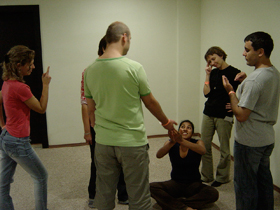When a man is subject to violence it is called torture,
but when a woman is subject to violence it is called culture.
What a controversial quote!

And definitely a statement to trigger very interesting discussions at trainings. Bringing in controversial cases—with themes ranging from violence against women, exploitation of welfare systems, or explaining terrorism or school performance with Islamic culture—and controversial statements such as the one of Nasim Karim often leads to heated discussions, to great frustration with getting the terms right, and eventually to relief—both from participants with majority and minority background—when, at the end, a consensus is reached about what should be named culture and what should definitely not be named culture.
The title of this article might be rather provoking for some, as we have been raised to think that cultural awareness is the way to create tolerance. But we fail when confronted with the above examples:
If violence against women is a cultural expression, should we then accept and respect it? And if doing so, wouldn’t we be feeding the extreme right with arguments against multicultural societies? And if we should not respect it, does it then mean that certain cultures are bad, primitive, and cannot be integrated?
often fails us.
Of course not! But there is no doubt that youth workers and trainers are confronted with such dilemmas. Let’s look at a concrete example: During trainings on multicultural teamwork, we use Forum Theatre{{3}} to explore conflicts that might arise in multicultural settings. The participants, using cases from their daily youth and social work, put escalations of conflicts on stage, eventually asking the spectators to intervene.
One group once put a young guy with ethnic minority background—played by a participant with ethnic minority background—as the oppressor of a female teacher and the school director, whom he accused of racism. The play started and the guy, who called himself Mohammed, entered the fictive computer-room, where his two friends were receiving classes from the female teacher. Mohammed and his friends were joking and ignoring the woman, and the teacher got upset about the disturbance of her class. Mohammed was therefore invited to a talk with the director, and this very fast escalated into open conflict, where Mohammed accused everyone of being racist. The play created lots of discussion on two-sided oppression and different tools for communicating and interacting with each other in respectful ways.
At first, we were rather surprised as a more “political correct” way of showing the scene would have been to put the teacher and the school director as oppressors of the ethnic minority guys. However, the play was touching upon exactly this dilemma: What to do when somebody explains or excuses negative behaviour with culture? Should we respect and accept their behaviour? Should we conclude that the culture is violent or bad?
My answer is another question: Do these happenings have anything to do with the thing called culture? The cause of the dilemma is to our belief that culture is not a concrete thing, but rather a concept that is used in many different ways. One example is the way that the extreme right in European societies has taken over the concept of culture: they are aware of and respect cultural differences – as long as they are practiced somewhere else! Change the notion of culture with race in the sentence – and feel the shivering! Another example is persons with ethnic minority background justifying violence against women by drawing on their culture.
culture into a new
concept of race?
Of course the way that the extreme right and some ethnic minorities use the concept of culture is very different from the way that it is used within youth work, anti-racism work etc (or is it?). But that is exactly the point: “Culture” is used to cover everything – and thus nothing. Basically the concept of culture is used by almost everyone to argue for their own point of view: being it the extreme right to explain the conflicts in current European societies (including terrorism) and to justify heavy discrimination, or some ethnic minorities themselves to justify what could otherwise be seen as transgressions towards e.g. women or homosexuals.
Everyone seems to be “aware of cultural differences” (even extremists on both sides) – and it quickly gets very difficult to see how more of such awareness—as is the goal of much intercultural learning—can actually contribute as a frame for the encounter between majority and minority and foster mutual respect and understanding.
We are, as the recognised (though controversial) Norwegian anthropologist Unni Wikan (2002) observes, turning culture into a new concept of race, as it becomes a term for the exotic, which we mainly apply to “them”, but not to ourselves.
Where majority youth is seen as having agency, will and opinion of their own, minority youth is often seen as “products of their culture” – defined by the nation where their parents or grandparents once lived. Minority youth committing a crime must therefore be caused by their culture – whereas it is caused by mental or social problems when a majority youngster does something similar. We thus mainly explain “the other’s” negative behaviour with culture, but don’t apply the term when they behave just like “us”.
today’s discourse
of exclusion.
What we observe is that the discourse of culture is becoming a new “discourse of exclusion”, where most people agree that we should appreciate and respect cultural differences, though at the same time use these cultural differences to explain high delinquency rates among minority youth, exploitation of the social welfare system, failure on the labour market, and even terrorism etc.
Just reading the newspaper on any other day, you will most probably encounter an article exemplifying this. What is lost is thus the critical social analysis of what defines these young people’s realities – apart from culture – namely (a lack of) access to education, and work, and spaces where decisions are taken, and much more. The concept of culture can thus be said to disempower us by hiding the real causes of behaviour and leaving us with no tools for meaningful integration.
What we need is not more awareness of cultural differences, but to beware of the way “culture” can be misused to argue for the wrong things. We furthermore need an alternative explanation of societal problems, and alternative means to deal with the challenges in order to truly include everyone.
This is the fourth published article of our critical series on intercultural learning by Lene Mogensen from In Dialogue.{{4}} Start with The Derdians if you have missed the beginning.
[[1]]Nasim Karim, a Norwegian of Pakistani descent, was able to escape Pakistan after being forcibly married there. She was almost beaten to death because she tried to refuse the marriage. “She managed, against all odds,” Unni Wikan writes, “to make her way to the Norwegian embassy in Islamabad and, with the embassy’s help, to flee the country.” She had to go to court to have her marriage annulled.[[1]]
[[2]]Wikan, Unni (2001) Generous Betrayal: Politics of Culture in the New Europe. University of Chicago Press.[[2]]
[[3]]Forum Theatre is a drama method developed by Augusto Boal to explore oppression and empower people to take steps towards this oppression.[[3]]
[[4]]It was originally written in 2006, and has lost none of its potency.[[4]]

Comments
2 responses to “Beware of culture!”
I really like this article, because it exemplifies my problem with ‘tolerance’.
I believe in equality in human dignity and, resulting from that, in human rights. Cultures are not static (if they were I’d need to be an order obeying Nazi, which seems to have been german ‘culture’ for some time in the past) but dynamic. And if I’m able to differentiate a crime from a cultural expression – as with your example of violence against women – then I’m positive that anybody else can do that to. Intercultural interaction has to allow for the phrase ‘I think what you do and how you do it is bad and here’re my arguments for that!’, for people to actually be able to talk with each other and eventually possibly understanding each other.
Thank you once again for this article, as there is a real chance that intercultural awareness and tolerance become the political correct form of not giving a shit and a drifting into relativism as a racism in disguise.
In September 2009, Berlin’s former Finance Minister, Thilo Sarrazin, states in an interview with Lettre International:
as Spiegel Online International translated parts of his interview.
It is exactly the phenomenon Lene describes so well – culture is used as the main reference, culture is blamed, culture is used as a shield, culture is used as an excuse for not having to engage with the underlying dilemmas.
How convenient! After all, who is interested in policies to keep cultural groups together, leading to de facto ghettoisations? Who is interested in outright refusal to respond to the shifting language constellations in education? Who is interested in decades-long neglect of human rights as a school topic? Who is interested in …?